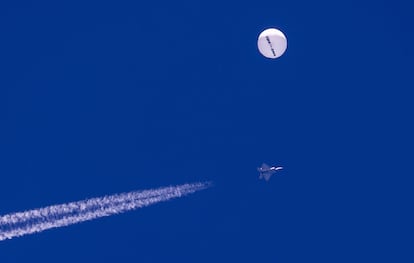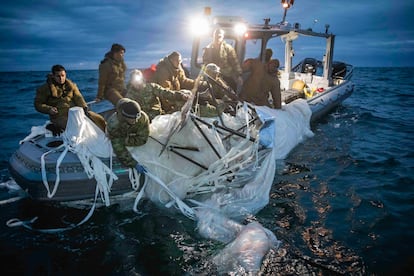After Chinese balloon downed, US faces mystery over unidentified flying objects
Authorities have shot down three different devices since Friday: the first was the size of a car, the second was cylindrical and the third octagonal


On Saturday, a US radar detected an anomaly in the northern US state of Montana. The Federal Aviation Administration (FAA) closed the airspace around Havre, near the Canadian border, citing defense-related reasons. Republican Congressman Matt Rosendale shared on Twitter that he was in direct contact with military commanders and that there was an unidentified flying object. The fighter jets were sent out to investigate and found nothing. It was a false alarm.
But on Sunday, radars detected another signal on Lake Huron. The fighter jets mobilized, and this time found an unidentified object, which was neutralized. It was the third unidentified object to be shot down since Friday.
On Friday, an unidentified object the size of a small car was taken down in Alaska. On Saturday, a cylindrical object was shot down in Yukon, Canada. The object neutralized on Sunday had an octagonal shape. The details surrounding the three events remain shrouded in mystery.
Indeed, a Pentagon spokesperson said that they could not even rule out the possibility that the objects are of alien origin. “I’ll let the intel community in the Counter Intelligence Community figure that out. I haven’t ruled out anything at this point. We continue to assess every threat or potential threat unknown that approaches North America with an attempt to identify them,” said General Glen D. VanHerck at a press conference on Sunday.
The unidentified objects were detected just days after the discovery of a high-altitude Chinese balloon flying over sensitive sites in the western United States. China claimed that the balloon was a weather research satellite that had blown off course. The US described it as a surveillance satellite. According to the US State Department, the balloon was equipped with antennas that could detect and intercept communications signals, as well as instruments for weather research. Washington argues that the balloon is part of a Chinese espionage program that has targeted more than 40 countries on five continents. The incident has heightened diplomatic tension between the two superpowers.

Meanwhile, many questions remain about the unidentified objects. According to the White House, the object shot down in Alaska was flying at an altitude of about 40,000 feet (just over 12,000 meters). It was the size of a small car – much smaller than the Chinese balloon, which was the equivalent of several buses. It was not a military threat, according to the Pentagon, but it did pose a risk to air traffic, as commercial planes typically have a cruising altitude of between 40,000 and 45,000 feet. The object was detected on Thursday and, upon the orders of US President Joe Biden, was shot down on Friday by an F-22 using an AIM-9X short-range air-to-air missile – the same type used to take down the balloon nearly a week ago.
The remains fell onto frozen waters. Finding them, amid snow and temperatures well below freezing, is no simple task. For now, the Pentagon knows neither its capabilities, origin nor purpose.
The object downed over the northwestern Yukon was detected Friday by the US Joint Air Command, which coordinates the Canadian and US air forces in the region. It was shot down by an F-22 on the orders of Canadian Prime Minister Justin Trudeau, who had previously spoken with Biden. Canadian Defense Minister Anita Anand said Saturday that it looked more like the Chinese balloon, but was smaller and cylindrical. Its origin, capabilities and purpose are also unknown, although the fighter jets that followed its trajectory had more time to observe it. The remains fell in a remote and rugged area, and efforts are also underway to recover them.
According to the Pentagon, the third object shot down on Sunday over Lake Huron was flying at an altitude of 20,000 meters. The object was octagonal, with strings hanging off, but had no discernible payload.
On Sunday, Senate Majority Leader Chuck Schumer said that he had spoken to the White House and that the first two objects were believed to be balloons, although much smaller in size than the Chinese one. However, on Sunday evening, Pentagon spokesman VanHerck said: “We’re calling them objects, not balloons, for a reason.”

UAP not UFOs
Unlike the Chinese balloon, the three objects have not been identified. For this reason, they could be defined as an unidentified flying object, or UFO. But given the acronym’s connotations with aliens, authorities and mainstream media have avoided using it. Indeed, to avoid these associations, and to include sightings of non-flying objects or phenomena that cannot be described as objects, authorities use the term unidentified aerial phenomena (UAP).
According to a report released by the Pentagon earlier this year, the number of UAP sightings has skyrocketed. The Pentagon collected 366 reports of unidentified flying objects. Of these, “more than half had unremarkable characteristics,” according to the report. There are 195 cases that have been characterized as balloons (163), drones (26) and other disturbances, such as birds, meteorological phenomena or airborne debris, such as plastic bags (6).
However, 171 sightings remain, whose origin is still unattributed. “Some of these uncharacterized UAP appear to have demonstrated unusual flight characteristics or performance capabilities. They require further analysis,” the Pentagon acknowledged.
Most of the new sighting reports come from United States Navy and Air Force pilots and operators, who witnessed the phenomena while conducting operational duties. Everything has been reported via official channels. The report stated that authorities “will continue to investigate any evidence of possible involvement of foreign governments in unidentified aerial phenomenon events.”
The detection of the three unidentified objects has sparked many conspiracy theories. The Pentagon said that it learned a lot from monitoring the Chinese balloon, and some believe that this information has helped authorities detect the signals from the unidentified objects and respond more quickly. However, the Defense Department does not believe the cases can be compared. When asked about if this were true on Friday, Brigadier General Pat Ryder, a Pentagon spokesman, said it was like comparing “apples and oranges.”

On Sunday, however, Assistant Secretary of Defense Melissa Dalton, said: “In light of the People’s Republic of China balloon that we took down last Saturday, we have been more closely scrutinizing our airspace at these altitudes, including enhancing our radar, which may at least partly explain the increase in objects that we’ve detected over the past week.”
Republicans have criticized Biden for waiting to shoot down the Chinese balloon, which was first detected in the Aleutian Islands in Alaska and then shot down off the coast of South Carolina. The White House argues that it waited until the balloon was over waters, and falling debris would not pose a risk to the population. This criticism may have put authorities on higher alert. “I think we’re all, including the media and the public, very attuned to balloons at the moment,” Ryder said Friday. John Kirby, a spokesman for the White House National Security Council, said the object in Alaska was shot down out of an abundance of caution.
And, of course, on social media there are UFO-inspired conspiracy theories that link the unidentified objects to aliens. Indeed, when General VanHerck did not rule out the possibility at the Sunday press conference, UFO became a trending topic on Twitter – before attention switched to the Super Bowl.
Sign up for our weekly newsletter to get more English-language news coverage from EL PAÍS USA Edition
Tu suscripción se está usando en otro dispositivo
¿Quieres añadir otro usuario a tu suscripción?
Si continúas leyendo en este dispositivo, no se podrá leer en el otro.
FlechaTu suscripción se está usando en otro dispositivo y solo puedes acceder a EL PAÍS desde un dispositivo a la vez.
Si quieres compartir tu cuenta, cambia tu suscripción a la modalidad Premium, así podrás añadir otro usuario. Cada uno accederá con su propia cuenta de email, lo que os permitirá personalizar vuestra experiencia en EL PAÍS.
¿Tienes una suscripción de empresa? Accede aquí para contratar más cuentas.
En el caso de no saber quién está usando tu cuenta, te recomendamos cambiar tu contraseña aquí.
Si decides continuar compartiendo tu cuenta, este mensaje se mostrará en tu dispositivo y en el de la otra persona que está usando tu cuenta de forma indefinida, afectando a tu experiencia de lectura. Puedes consultar aquí los términos y condiciones de la suscripción digital.








































